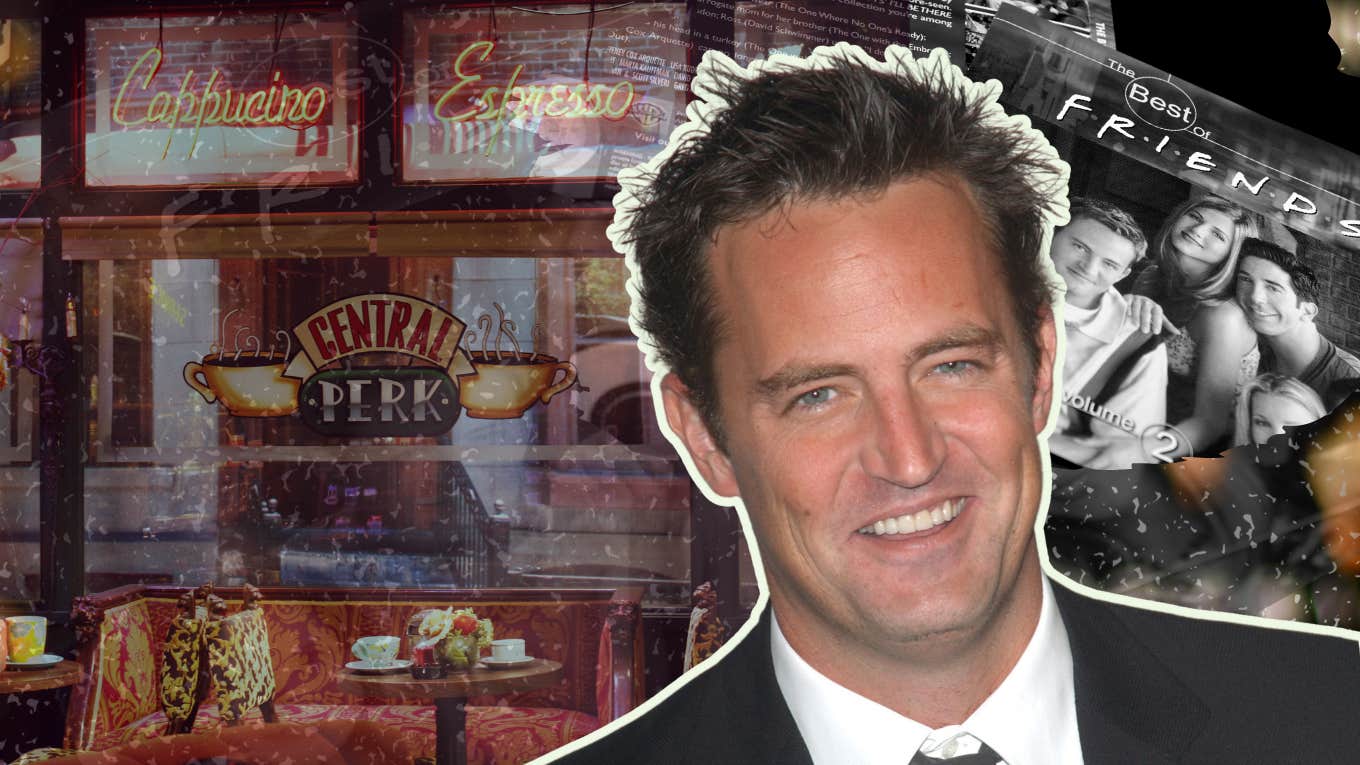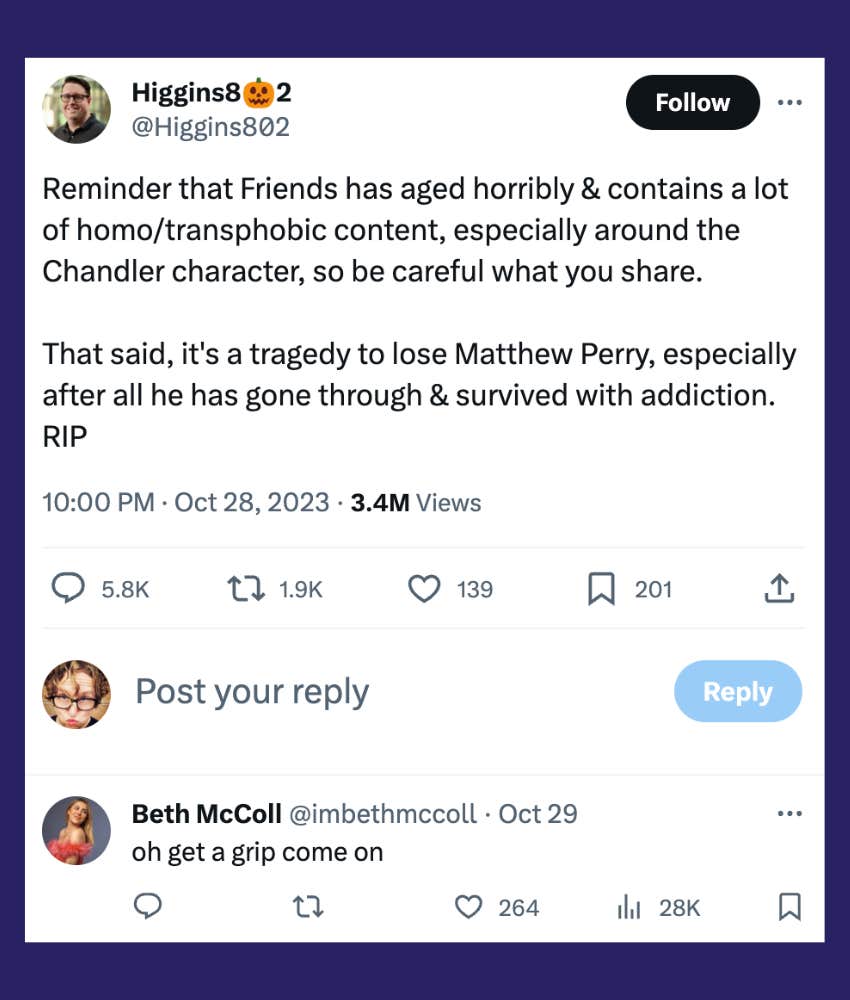People Who Say It's Uncool To Mourn Matthew Perry Or Say 'Friends' Didn't Age Well Really Need To 'Go Touch Grass'
Sure, 'Friends' was imperfect. But do we really need to rehash it in the wake of Matthew Perry's death?
 Featureflash Photo Agency, Kraft74, ssi77, Mariia Illiashevych / Shutterstock
Featureflash Photo Agency, Kraft74, ssi77, Mariia Illiashevych / Shutterstock As you've no doubt heard by now, legendary comedic actor Matthew Perry passed away this weekend in what appears to have been an accidental drowning at the age of 54.
Perry was of course one of the megawatt stars of "Friends," one of the most successful sitcoms in the history of television and one of the few pre-streaming shows that has transcended generational divides, making Perry's loss deeply felt even by people who weren't fans of the show. Its cultural impact was just that deep.
But even as fresh as the news is, some online have taken Perry's death as an opportunity to pontificate about how problematic 'Friends' was by 2023 standards.
That's a well-trod line of thought — Googling "Friends was problematic" returns 115,000,000 results, many of them full-length articles in big-name publications.
This isn't new. Which makes you wonder why people feel the need to rehash it now, days after the loss of a beloved Hollywood icon.
It's OK to mourn Matthew Perry even if 'Friends' didn't age well.
It's weird to even need to say that, but some of the internet discourse out there is downright… well, bizarre. The majority of the social media chatter around Perry's death seems to be heartfelt expressions of sadness. But some have suggested that sadness ought to be tempered by the fact that "Friends" was not socially or politically in step with modern mores.
 Photo: Twitter
Photo: Twitter
One such tweet reads, "reminder that Friends has aged horribly & contains a lot of homo/transphobic content, especially around [Perry's] Chandler character, so be careful what you share."
This tweet has gone viral, in part because there seems to be a near-consensus that it is overwrought and crass. As another Twitter user put it, "Matthew Perry’s death is not an opportunity to score virtue signaling points."
"Friends" is, of course, a product of its 90s and early 2000s era. As such, it is very much out of step with 2023 in some key ways, from the running jokes about how fat Courteney Cox's Monica used to be, to the near-total whiteness of the cast for all 10 years of its run.
But what is frequently cited as 'Friends' biggest problem area was the way it dealt with LGBTQ issues and people.
As was common practice in less enlightened times, and especially in the 90s, queer people and "gay panic" were frequently used as "Friends" punchlines, and Perry's character Chandler Bing regularly being perceived as a gay man was one of the show's many running gags.
Causing even more consternation was one of the root causes of Chandler's discomfort with being perceived as gay — his father had left his family after coming out as a gay man and becoming a drag queen, who later transitioned and became a woman played by husky-voiced 80s femme fatale Kathleen Turner in a series of guest appearances.
In 2023, the moment when Chandler and his transgender parent are reunited is indeed cringe-inducing. The two meet in a drag bar where Turner's character performs, and Perry's sardonically spoken "And there's DADDY" as he sees a busty, heavily made-up, sequins-and-maribou-clad Turner for the first time in decades sends the studio audience into hysterics.
That, of course, would never fly today, and for good reason. Nor, likely, would much of "Friends" other gay-themed jokes and content. But always missing from these criticisms is vital context.
For one, David Crane, one of the show's three creators, is himself a gay man, making much of the supposedly homophobic content seem at least to some degree self-deprecating.
More important, the real story of the relationship between Chandler and his parent is not the mockery of Turner's character's transgender identity — a concept foreign to the vast majority of Americans, most queer ones included, at the time — but rather Chandler's gradual arrival at acceptance of the person his father has become.
For a time when the term "transgender" mostly didn't even exist in the mainstream, let alone any level of acceptance of the very concept, it's a remarkably progressive narrative.
And while "Friends" may have relied on "gay panic" for laughs to a degree that now seems tasteless, it also featured a lesbian couple with a child for the entirety of its run — practically unheard of in 1994 on network television, let alone on what became the most popular sitcom at the time.
Just three years later, Ellen DeGeneres would not only have her sitcom canceled but her entire career blacklisted for nearly a decade because she came out as a lesbian. The 90s were not queer-friendly times by any stretch of the imagination.
And while it's certainly arguable that I'm giving "Friends" too much credit, it's also arguable that by the standards of the 1990s, the show was in its way revolutionary for the time — and it was Matthew Perry at the center of much of that queer "Friends" content.
Even Chandler's own gay panic can be construed as progressive, depending on the lens through which you view it.
The year after "Friends" premiered, America was shocked by the infamous case of Jonathan Schmitz, who brutally murdered his gay coworker Scott Amedure when he confessed to having a crush on Schmitz during an appearance on "The Jenny Jones Show."
Schmitz was able to get his charges decreased from first to second-degree murder on the basis that he was humiliated by Amedure's overtures, a ruling the barbarism of which didn't even register for most people at the time, barely raising an eyebrow. At least Chandler seemed to mostly take his gay panic on the chin and play it for a chuckle.
But all media and culture ends up seeming problematic eventually. That's how the evolution of culture and media works — we learn how to progress by watching what we used to do, cringing, and doing better.
(This is precisely why conservative groups keep trying to ban books and have the history of racism excised from school curricula, by the way.) Importantly, it is also how we are able to progress in the first place.
We can get a lesbian couple on TV in 1994, we just have to occasionally make them the butt of the joke to do it. But hey — a lesbian couple got on TV, and gay kids in the 90s got to see themselves represented, even if poorly, on television. That matters, especially since, at the time, the default was to not have queer people on TV at all.
The same, I would argue, goes for transgender representation. Yes, Turner's character was played for laughs, and the fact that she was played by Turner is itself a problem we now know better about.
But ultimately, that story arc was one in which a transgender person was eventually treated like a human being and accepted by her son — just a few years after transman Brandon Teena was brutally assaulted and murdered after being found out to be transgender in 1993, as depicted in the film "Boys Don't Cry."
I have cringed at "Friends" many times as a gay man myself, but that progress still matters. And while Matthew Perry wasn't the writer who created it, he is the actor that gave so much of it its beating heart. That should be celebrated, not denigrated.
But even if none of that were true — even if "Friends" is as egregious as so many of its critics say it is — is that really relevant to Perry's death?
'Problematic' or not, 'Friends' touched the hearts and minds of untold millions of people all over the world.
 Photo: Mariia Illiashevych / Shutterstock
Photo: Mariia Illiashevych / Shutterstock
The vast majority of the time, people were not sitting down on Thursday nights and tuning into NBC to feel bigotry and hatred. They were feeling the kind of light-hearted, carefree joy we are barely even capable of anymore given how sideways the world has gone since the 90s.
It is that joy that people are mourning now with Perry's death. Why are we asking people to ignore it, to brush it aside, or to put an asterisk on it simply because "Friends" was a product of its era — and one that was more progressive than the mainstream at the time, at that?
"Friends" has also frequently been derided as hokey and trite and uncool, the sort of bland, paint-by-numbers comedy that would never fly in today's far more savvy and cynical environment. (Shows like "Big Bang Theory," at its best eminently worse than even the lamest episode of "Friends," begs to differ, but that's a whole other essay.)
Accordingly, people have contended that mourning Perry is likewise uncool or unsavory, overwrought and melodramatic. But none of this accords with human nature or the ways our brains and hearts work.
As psychologist Casey Lytle explained in a recent TikTok, "Grief is dictated by the volume of emotional memories that are attached to that person… that person had emotional significance and emotional relevance to you through their work or through who they are... When that person is gone, your brain grieves that they are gone.
Lytle went on to compare this to how we cry about the deaths of fictional characters in books and movies — who are not even real people, after all.
Asking people to temper their grief over Perry because the show he was on was only five years ahead of its time instead of 30 is mean-spirited and absurd enough on its face.
But it's also disrespectful to the way Perry himself hoped to be remembered.
In a 2022 interview with the CBC's Tom Power, Perry said he hoped his legacy would be the people he helped get sober over the course of his own struggles with addiction.
"The best thing about me, bar none, is that if somebody comes to me and says, ‘I can’t stop drinking, can you help me?’ I can say ‘yes’ and follow up and do it,” Perry told Power. “When I die, I don’t want ‘Friends’ to be the first thing that’s mentioned. I want that to be the first thing that’s mentioned. And I’m gonna live the rest of my life proving that."
Perry has also spoken openly, including in this same interview, about how difficult the white-hot spotlight of "Friends" made it for him to survive his many battles with drug and alcohol addiction, which eventually culminated in a medical crisis in which he was given a 2% chance for survival.
That he lived seems like some kind of a miracle. That he was also able to be part of a show and a character arc that, for all its anachronistic faults, pushed forward the very progress it is routinely accused of hobbling is a triumph all its own.
Let's remember him for this good that he did, without stipulations, and let it be his legacy.
If you or someone you know is struggling with addiction, help is available. Reach out 24/7 to SAMHSA’s National Helpline, 1-800-662-HELP (4357) or text 435748 (HELP4U) to find help near you.
John Sundholm is a news and entertainment writer who covers pop culture, social justice and human interest topics.
